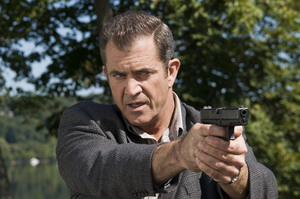Gibson emerges a shadow of former self
Will Mel Gibson ever come back to us? Viewers find themselves pondering this question long before the opening credits of Edge of Darkness ever begin to fall. Two hours later, the question lingers. What has become of the zealous figure on the horizon who once ran down bandits in a police interceptor recklessly, repeatedly spoiled Danny Glover’s retirement plans and attempted to pass as the muck-stained father of Scotland?

On edge · Det. Thomas Craven (Gibson, above) attempts to find his daughters killer in Edge of Darkness. The film is a remake of Director Martin Cambell’s 1985 BBC miniseries of the same name. - Photo courtesy of Warner Brothers Pictures
Here, in Martin Campbell’s adaptation of his own 1985 miniseries, Gibson turns up as Det. Thomas Craven, a stalwart in the Boston police force and father of Emma Craven (Bojana Novakovic), who has just returned home for a spontaneous visit. Within minutes, their reunion is inconveniently cut short when Emma’s stomach is blown apart by two shotgun-wielding thugs.
Of course, the murder reeks of white-collar undercurrents, chiefly a nuclear energy corporation called Northmoor. Audiences soon learn that Emma, an employee at Northmoor, became involved with a group of activists devoted to exposing sinister, secret projects within the company facilities that involve right-wing politicians, foreign adversaries and lots and lots of money.
Had the headquarters of Northmoor been housed in a looming skyscraper or even a warehouse such projects might come as a surprise. Instead, the massive headquarters sits atop a wooded hill, overlooking a glassy lake, serenaded by the screams of feral wildlife. The last time rural Massachusetts looked so evil, the local policemen were crushing Giles Corey to death with boulders.
Still, the film has a sizeable running time to fill and sends Craven hurtling across the bay state, shaking down Emma’s various acquaintances for information. These include her boyfriend (Shawn Roberts), who introduces himself by initiating a knife fight, a stammering co-worker (Caterina Scorsone) and her grinning boss, Jack Bennett (Danny Huston, who has not been this loathsome since his turn as an animalistic killer in The Proposition).
The film’s director partnered with Boston local William Monahan, who wrote 2006’s The Departed, to tell a familiar story in a time of rising public animosity toward big business. The decision is relevant and smart, but, mystifyingly, the film lacks any hint of rage. Even if corporate crime is not enough to get the blood boiling, surely the calculated murder of a young girl is.
Worse yet, the fire that Campbell and Monahan fail to harness seems to have smoldered out in Gibson’s performance as well. Even as he holds his beloved daughter, drenched with her blood, Gibson’s emotional response seems more appropriate for an undercooked chicken breast. Far milder predicaments have sent the actor into pits of fury and dejection so palpable that viewers cannot help but suffer with him.
Perhaps it then makes sense that the film’s strongest bits involve a similarly detached individual, Mr. Jedburgh (Ray Winstone). Stocky but sharp and strong as an ox, Jedburgh turns up on Craven’s doorstep with information regarding his daughter’s death, all the while making no attempt to hide his identity as a bagman for Northmoor. Both childless, though by different means, the men have little to do but ponder their own lonely disaffection, between the everyday fistfights and car chases and before one decides to kill the other. Their encounters are more therapy sessions than bargaining meetings.
To describe Edge of Darkness as a thriller about a dead child is accurate, only the child is Gibson himself. The last few years have clearly taken a tremendous toll on the man, who appears here as a shadow of the actor he once was. Acknowledging Craven’s very public struggle for justice, the film asks whether it is best to emerge from despondency victimized and bloody or resilient with guns blazing.
Even after one viewing, Gibson still seems the ideal man for the part, but his long-awaited leap forward from infamy is a false one. The firearms are all here, but Gibson remains on the cross.
